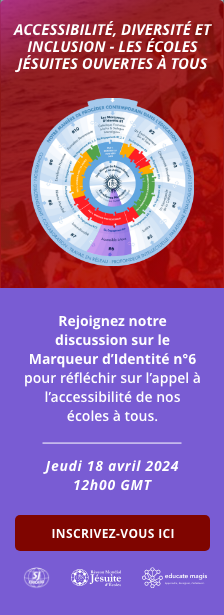The youngest, 5th grader students are 10 years old, the eldest, 12th graders are 19 in the JEZSU (Fényi Gyula Jesuit High School), Hungary. 8th graders are right in the middle, for them it is the time when they can only aspire to becoming scout leaders, choir members, prayer leaders, school radio presenters etc. Normally they belong to the “little students.”
However, the Coronavirus pandemic rearranged it all. Upper grades had to go online in November 2020, and only 5-8 graders have been allowed to go to school.
Suddenly the 8th graders, 15 year-olds had to take over all responsibilities from grades 9-12 in order for normal school life to go on. These responsibilities include school radio, morning prayer, logistical tasks like moving furniture or carrying things, playing music and singing at mass, and many more. The 8th graders threw themselves into these tasks with exceptional enthusiasm. It has always been a conscious and well designed effort by the School Chaplaincy team – Jesuits, lay members and a religious sister – to involve students in the coordination and creation of the various online and offline activities in school life.

The school radio reaches far beyond the walls of the school thanks to live streaming. The whole JEZSU community – students, parents and teachers, even alumni – either at school or online – join in the morning prayer on school days at 8 am.
Peter enjoys radio work: “Now we write and lead the morning prayer in the school. This is a special opportunity for us, 8th graders. Preparing the morning prayer and radio programs is a creative process. Not only do we have to write the script, we can also add songs and music. We can share our thoughts and philosophy even.”
Ádám believes the morning prayer is an important part of the day: “I remember, in grade 5 I did not always listen to the words, but it was good to sit quietly and pull myself together before the lessons started.”
Regina enjoys leading the audience toward gratefulness. “It is very helpful to start the day asking ourselves why we are grateful for that day. It has become a habit of mine and I learnt it from the school morning prayer when I was little.”
Luca is concerned about the age diversity of the audience: “There are the really young children along with teens and adults, so I think it is quite a challenge to present a prayer so that the young children understand, while it touches the hearts of the others also.”
Feedback is important according to Ábel. “We are not always sure we are doing well, but our teachers, the members of the Chaplaincy and the IT department support us. Students give us feedback, and the comments to the live stream are very encouraging, even when we made some mistakes or know it was not really perfect.”
Normally church services are served by members of the school choir, all 9-12th graders, while 8th graders only dream about becoming a member later. Now serving with their voices also fell upon the 8th grade.
Abel thinks the school choir is one of the greatest community building forces in the school. “Occasionally there are two or more services on a special feast day, and we sing in all of them. It is quite exhausting, but it is worth it for the positive feedback from fellow students and for the opportunity to work with Mrs Klára Herpainé Velkey, the choir master.
The children all agree with Ádám that the experience and the responsibility made them more mature. “Being the oldest among students is a great responsibility. In 5th grade we used to look up to the 12th graders and tried to imagine that one day we would grow up to be like them. Now with the 12th graders studying from home, the little ones have us to look upon. We have to show them what it means to be a Jesuit student. We have to live the school culture, lead them in their spirituality and show good examples.”

Se connecter ou Adhérer
pour créer et afficher des commentaires

